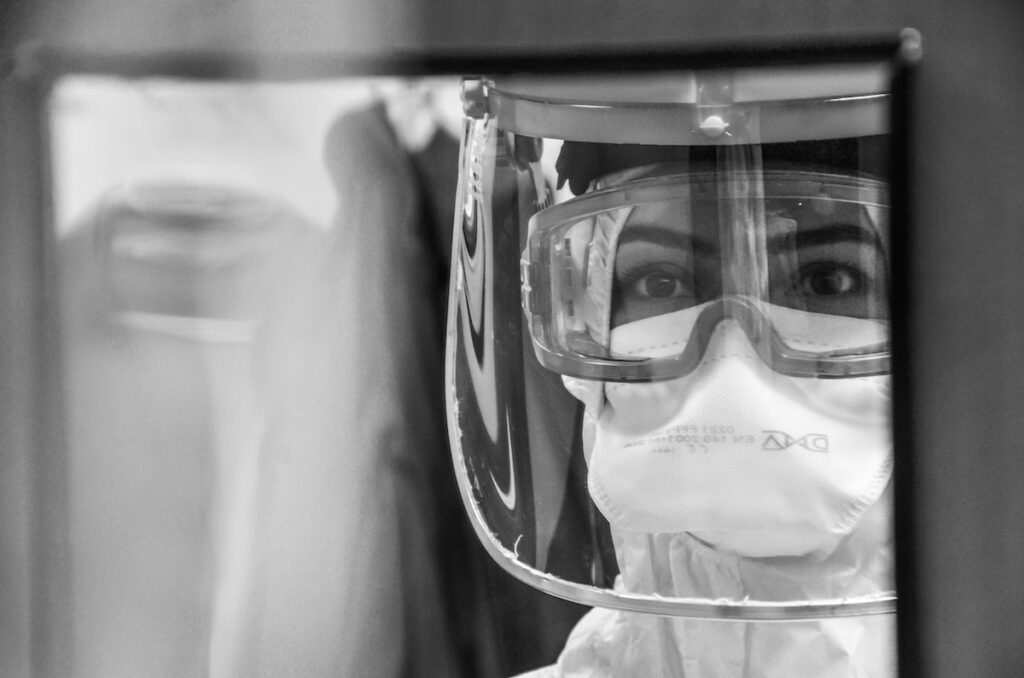
As COVID-19 tightened its grip on our lives in 2020, NHS staff put their health at risk and faced unprecedented pressure and stress (Heilbron, 2020). Already prior to the pandemic, healthcare staff experienced burnout; emotional distress characterised by emotional exhaustion, depersonalisation and low efficacy (Brotheridge & Grandey, 2020; Kopacz et al., 2019; McKinley et al., 2020; Institute for Fiscal Studies 2018; Rhodes et al, 2020). Probable causes included underfunding and systemic pressures. When COVID-19 struck, adding fuel to the fire was moral injury – the distress that arises from actions, or lack of actions, that violate one’s moral code (Litz et al, 2009).
The perpetrator of moral injury can be the individual wherein they feel to have acted unethically (Williamson et al., 2020) or it can be a person of trusted authority who betrays what is perceived as right in a high-stakes situation (Wiinikka-Lydon, 2017). Exploring betrayal-based moral injury can reveal causes of burnout otherwise obscured by the individualistic approach of seeing the person as the perpetrator. It enables the analysis of systemic factors and brings an institutional lens to examine management, leadership and workplace culture (Wiinikka-Lydon, 2017).
This qualitative study explored NHS staff experiences of burnout, potentially morally injurious events and the role of leadership throughout the pandemic (French et al., 2022).

Examining moral injury amongst NHS staff during the pandemic shines a light on the experiences of institutional betrayal within the UK healthcare system.
Methods
Sixteen working-age adults were recruited. All held NHS clinical roles ranging from trainee to senior management. Twelve identified as women, 15 as White and one as Asian Indian. The inclusion criteria were individuals who worked during the pandemic and self-identified as having experienced work-related stress or burnout.
A semi-structured interview technique was used. All data were anonymised, geographical locations were removed, and recruitment was done separately from Trusts so that participants could openly discuss their Trust without fear of identification. This research was conducted from a critical realist approach (Hayfield et al.,2019, p. 530) and reflexive thematic analysis (Braun & Clarke, 2019) was used to analyse the data.
Results
Three main themes emerged.
1. Abandonment as betrayal
Betrayal was described as situations where trust is violated by an individual, an organisation, or “those in charge”. It is in these situations where betrayal-based moral injury can occur and cause burnout.
Participants expressed forms of betrayal related to abandonment. They perceived a lack of care from leadership, heightened by management being physically absent. Participants felt leadership saw them as disposable, replaceable, their personal worth dehumanised and their deaths meaningless.
… they didn’t have the equipment [PPE] and it didn’t matter ‘cause it was only us going in there.
Throughout the interviews, anger towards the organisation was pervasive. Participants saw the betrayal as a choice, since leadership was aware of the dangers and chose not to protect them. This was seen as the organisation violating expectations and moral principles, consequently losing its trustworthiness.
2. Dishonesty and lack of accountability
The behaviour of leadership following errors was also seen to profoundly impact levels of stress and burnout. Apologies were seen as “moral acts” where one takes accountability for a mistake, intentional or not. Participants identified that leadership dismissed its responsibility and was reluctant to recognise and resolve feelings of betrayal. This prevented “moral repair”, meaning that even when errors were seen as unintended, burnout still took hold as the main contributor shifted to lack of accountability.
Perceived dishonesty and lack of leadership transparency, which put vulnerable colleagues at risk, was seen both as disrespectful and a kind of betrayal. The failure to repair the relationship caused moral injury, resentment and loss of trust. This dishonesty was also perceived to ignore professional expertise and impose possibly unethical decisions. Where staff opinion was not recognised, moral repair was compromised as those injured were not a “moral equal”.
3. Fractured relationship to management or NHS
Leadership breaking expectations caused some participants to believe that finding a better working environment in the organisation was impossible. Consequently, they wanted to leave their roles, revealing how moral injury may also destroy the possibility for trust in the future.
I feel like I’ve reached the end of the road.
A few participants did, however, tell of hope and empowerment despite the painful relationship breakdown with the NHS. The authors suggest this could lead to the development of a “meaningful narrative”, which may protect mental health following trauma (Greenberg et al., 2020). This is not about reframing the situation rather, it is about changing things for a better future.

The causes of burnout and moral injury among NHS frontline workers are myriad and the consequences profound, a new study suggests.
Conclusions
Through the lens of betrayal, this article explored NHS clinical staff experiences of burnout during the pandemic. The authors illustrate the significant impact of betrayal-based moral injury on distress and burnout and the enflaming result of lack of leadership acknowledgment.
With high turnover and staff stability decreasing, unrepaired moral injury is likely to further affect NHS staffing shortages (Reed, 2022). From working in IAPT where staff turnover is common, I see daily the severe repercussions of staff shortage on treatment waiting times, staff stress, and community wellbeing.
To minimise the damage of error, it is imperative that mutual trust be regained and that leadership at all levels acknowledge their mistakes.

The failure of NHS leadership to take responsibility for errors and engage in moral repair can lead to a lasting loss of trust within an organisation.
Strengths and limitations
The semi-structured interview technique used by the research team allowed for focussed, in-depth answers, whilst thematic analysis gives transparency to how the results were reached and combats confirmation bias. The efforts made for participant anonymity reduces the risk of desirability bias (socially acceptable responses to avoid reprisal) and enables honest reflections, which enhances data reliability. That participants represented a range of job roles supports the generalisability of the results.
The focus of the study may also offer a therapeutic effect. Participants were offered space for their experiences to be reflected on, taken seriously and used for positive change, whilst readers with similar experiences may find companionship and explanation to their emotions.
On the other hand, the authors acknowledge the lack of ethnic and cultural diversity amongst the sample, possibly caused by the researchers being white, which may introduce sampling bias. Additionally, insight into causes and interpretations of errors alongside barriers to acknowledgement may have been left unidentified by not having explored whether the participants – particularly those in management roles – felt to have caused betrayal themselves.

The study underlines the structural challenges NHS staff face and the ways the pandemic heightened the sense of acting against values and moral beliefs.
Implications for practice
The authors suggest that while trauma-informed psychological support for staff is needed, leadership (including the government) must be educated on moral injury and engage in moral repair to rebuild trust. Policy development should emphasise the inclusion of staff expertise and views in decision-making. A systemic change could assist leadership to stay aligned to organisation values and therefore prevent betrayal.
Future research could assess a larger sample, also using quantitative data, of NHS staff to further the generalisability of the results. Examining leadership samples may deepen our understanding on the impact of responsibility level or lack of patient contact and reveal preventable obstacles and valuable areas to address.
Thank you to all participants. For their work during the Covid-19 pandemic and for their reflections on their experience of betrayal.

People in leadership positions need to actively listen to their staff , promote collective care and prevent burnout.
Statement of interests
I confirm that I do not have any conflicts of interest.
Links
Primary paper
French, L., Hanna, P., & Huckle, C. (2022). “If I die, they do not care”: UK National Health Service staff experiences of betrayal-based moral injury during COVID-19. Psychological Trauma: Theory, Research, Practice, and Policy, 14(3), 516. https://psycnet.apa.org/record/2021-82683-001
Other references
Braun, V., & Clarke, V. (2019). Reflecting on reflexive thematic analysis. Qualitative Research in Sport, Exercise and Health, 11(4), 589–597. https://www.tandfonline.com/doi/pdf/10.1080/2159676X.2019.1628806
Brotheridge, C. M., & Grandey, A. A. (2002). Emotional labor and burnout: Comparing two perspectives of “people work”. Journal of vocational behavior, 60(1), 17-39.https://www.sciencedirect.com/science/article/pii/S0001879101918159
Greenberg, N., Docherty, M., Gnanapragasam, S., & Wessely, S. (2020). Managing mental health challenges faced by healthcare workers during covid-19 pandemic. bmj, 368. Managing mental health challenges faced by healthcare workers during covid-19 pandemic (conacyt.mx)
Hayfield, N., Terry, G., Clarke, V., & Ellis, S. (2019). “Never say never?” Heterosexual, bisexual, and lesbian women’s accounts of being childfree. Psychology of Women Quarterly, 43(4), 526–538. https://researchcommons.waikato.ac.nz/bitstream/handle/10289/13148/Hayfield%20Terry%20Clarke%20Ellis.pdf?isAllowed=y&sequence=2
Heilbron, A. (2020, April 15). Mental health & COVID-19, supporting the mental health of frontline health workers: What are organisations doing already? What more needs to be done? (Covid-19 Webinar 2).
Iliffe, S., & Manthorpe, J. (2019). Job dissatisfaction,‘burnout’and alienation of labour: undercurrents in England’s NHS. Journal of the Royal Society of Medicine, 112(9), 370-377. Job dissatisfaction, ‘burnout’ and alienation of labour: undercurrents in England’s NHS – Steve Iliffe, Jill Manthorpe, 2019 (sagepub.com)
Institute for Fiscal Studies. (2018). Securing the Future: Funding Health and Social Care to the 2030s.
Kopacz, M. S., Ames, D., & Koenig, H. G. (2019). It’s time to talk about physician burnout and moral injury. The Lancet Psychiatry, 6(11), e28. https://www.thelancet.com/pdfs/journals/lanpsy/PIIS2215-0366(19)30385-2.pdf
Litz, B. T., Stein, N., Delaney, E., Lebowitz, L., Nash, W. P., Silva, C., & Maguen, S. (2009). Moral injury and moral repair in war veterans: A preliminary model and intervention strategy. Clinical psychology review, 29(8), 695-706. https://citeseerx.ist.psu.edu/viewdoc/download?doi=10.1.1.1083.7546&rep=rep1&type=pdf
McKinley, N., McCain, R. S., Convie, L., Clarke, M., Dempster, M., Campbell, W. J., & Kirk, S. J. (2020). Resilience, burnout and coping mechanisms in UK doctors: a cross-sectional study. BMJ open, 10(1), e031765. https://bmjopen.bmj.com/content/10/1/e031765.abstract
Reed, J. (2022). NHS in England facing worst staffing crisis in history, MPs warn. BBC. https://www.bbc.co.uk/news/health-62267282
Rhodes, A., Ferdinande, P., Flaatten, H., Guidet, B., Metnitz, P. G., & Moreno, R. P. (2012). The variability of critical care bed numbers in Europe. Intensive care medicine, 38(10), 1647-1653.
Williamson, V., Murphy, D., & Greenberg, N. (2020). COVID-19 and experiences of moral injury in front-line key workers. Occupational Medicine, 70(5), 317-319.https://www.ncbi.nlm.nih.gov/pmc/articles/PMC7184422/
Wiinikka-Lydon, J. (2017). Moral injury as inherent political critique: The prophetic possibilities of a new term. Political Theology, 18(3), 219-232.https://www.tandfonline.com/doi/abs/10.1080/1462317X.2015.1104205
Photo credits
- Photo by Ömer Yıldız on Unsplash
